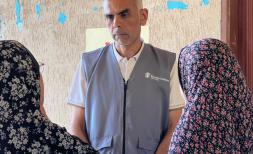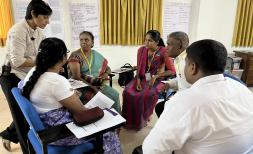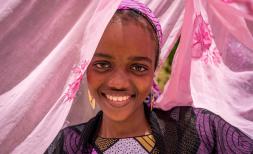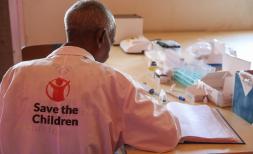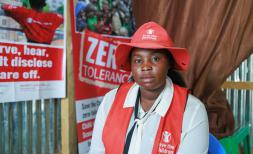We are at a crossroads:100-years of hard-won progress in making the world a better place for children could be undone if we do not act now
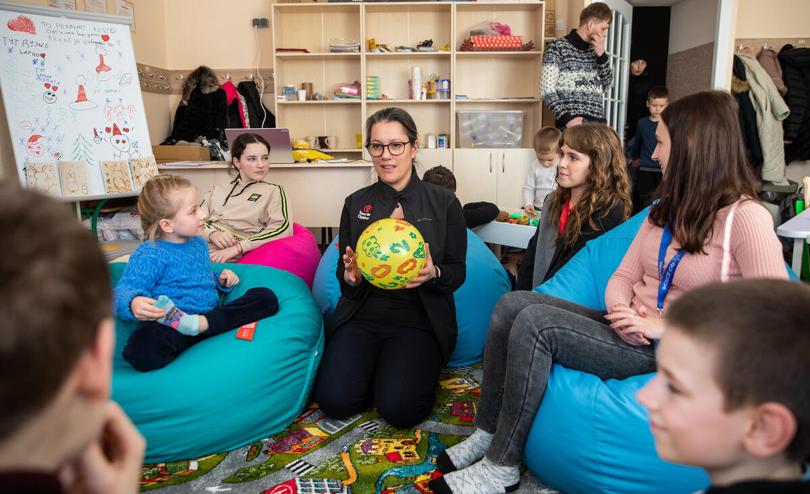
SCI CEO Inger Ashing holds a ball and plays with children in a Child Friendly Space in Kyiv region, Ukraine. Oleksanr Khomenko/ Save the Children.
I am small but my ideas are big. I want to make the world a better place. I am asking [world leaders], please provide space for me to speak freely and share all my ideas. When you listen to me, you are listening to all future generations.”
These are the words of Bhumika, a 16-year-old girl from Nepal who dreams of a world where every child’s voice is heard and respected. Like many children she is full of ambition and hope, telling me with great enthusiasm about her ideas for the future.
This year marks 100 years since the League of Nations adopted our founder Eglantyne Jebb’s Geneva Declaration of the Rights of the Child. The world at that time was a very different place for children than it is today. Regarded as the property of their families, rather than a person in their own right, children’s voices went unheard. A child was expected to contribute to the family income, perhaps working on the family farm, in a factory or a mine. Education was the realm of the privileged. Few children finished primary school; even fewer completed high school. A girl marrying at 16 was not seen as extraordinary.
A lot has changed in 100 years. When Jebb penned her rights document, one third of children died before their fifth birthday. Today that probability has fallen to less than four in 100. Almost nine in 10 primary and six in 10 secondary-age school children now complete their education. About 90% of children are no longer forced to engage in the kind of work that deprives them of their childhood and harms their development.
While it is outrageous that one in two children suffer from some sort of violence each year, attitudes are shifting, albeit slowly. In 2024, Tajikistan became the 67th country in the world to outlaw corporal punishment in all settings including the home. Progress has been such that today the 1989 UN Convention on the Rights of the Child, which establishes the rights of children and the belief that childhood should be a protected time, is the most widely ratified human rights treaty in history.
In many places, however, children are still being denied their rights, while in others, rights hard-won over the past 100 years are being reversed. Children’s rights and voices are disappearing from the policies that shape their world.
The extraordinary effort it has taken – by governments, civil society, and children themselves - to get to where we are today, albeit far from where we need to be - is why the current erosion of progress terrifies me. Catastrophic conflicts for children, from Gaza to Sudan to Ukraine, rising child poverty and the frightening reality of the climate crisis all pose a huge threat to one hundred years of gradual and hard-won gains.
Children worldwide are facing hunger, poverty, inequality, and discrimination. One in five are married, or in a union, before they reach 18 – including four in ten in the poorest countries. Childhood hunger remains unacceptably high.
Around one in five children today are growing up in a conflict zone, while one child in 50 is forcibly displaced according to our analysis of UNHCR figures - double the number a decade ago. Conflict violates every single right of a child and represents perhaps the starkest illustration of how progress can be swiftly undone.
Earlier this year in a refugee transit centre in Renk, South Sudan, I visited one of the child friendly spaces Save the Children operates where children can play, learn and express themselves in a safe place. The seven children I spoke with shared unimaginably heartbreaking stories of loss and hardship. They’d all experienced the trauma of war in their home country of Sudan and were at the early stages of starting their new lives with their families in a new country. The comfort of our child friendly space and the support of psychologists provided the children with a space to begin processing their experiences. A 13- year-old boy confidently shared a poem he wrote with us:
In chase of peace, for the future I dream. But life teaches me a lesson, in the reality of hard times… my hope is to find peace and go to school.”
Tragically, the stories of the children I met in Renk are not uncommon. The devastating conflict in Sudan has forced five million children from their homes, plunged 25.6 million people into acute hunger, and has led to record numbers of children killed, injured or facing other grave violations. In Gaza, every child is out of school, nearly all children are at imminent risk of famine, and devastating childhood diseases - such as polio that we hoped were a thing of the past - are back.
But despite such challenges, children are speaking out about their rights in a way that would bring Jebb pride.
Naomi, 14, from South Sudan shared with us her eloquent argument for why protecting the planet is so important for children like her.
The adults do not inherit the land from their ancestors, but they borrow it from the future. Which means we are the future. So, when you borrow something, you would always want to keep it safe so that you give it back to the owner in a very good condition. I would like to urge the adults or the world leaders to keep the world they borrowed from us the children in a very good condition.”
Children’s rights and the UN Sustainable Development Goals – our roadmap to end poverty and inequality, achieve peace and safeguard our planet - must be put at the centre of policy and financing decisions to create a safer, greener and more sustainable world.
Respecting children’s rights and heeding their own calls to action is fundamental in maintaining the kind of world that Jebb and countless other campaigners, organisations and governments have fought to build. Leaders need to listen to children and provide safe, meaningful, child-friendly spaces where children can speak freely, and their ideas are respected. Children have the best insights into what actions are needed to protect their daily lives, and their futures.
In the words of Celine, a 13-year-old child from Syria who lives in Egypt:
I wish to have a future full of hope, peace and love and [where] all people and nations can help and support each other”.
Let’s work alongside her to co-create that future so the next 100 years bring a brighter reality for children.
